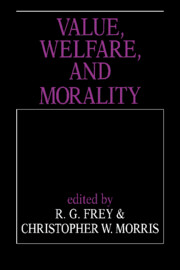Book contents
- Frontmatter
- Contents
- List of contributors
- Preface
- 1 Value, welfare, and morality
- 2 The land of lost content
- 3 Putting rationality in its place
- 4 Can a Humean be moderate?
- 5 Welfare, preference, and rationality
- 6 Preference
- 7 Reason and needs
- 8 Desired desires
- 9 On the winding road from good to right
- 10 Value, reasons, and the sense of justice
- 11 Agent-relativity of value, deontic restraints, and self-ownership
- 12 Agent-relativity – the very idea
- 13 The separateness of persons, distributive norms, and moral theory
- 14 Harmful goods, harmless bads
11 - Agent-relativity of value, deontic restraints, and self-ownership
Published online by Cambridge University Press: 07 December 2009
- Frontmatter
- Contents
- List of contributors
- Preface
- 1 Value, welfare, and morality
- 2 The land of lost content
- 3 Putting rationality in its place
- 4 Can a Humean be moderate?
- 5 Welfare, preference, and rationality
- 6 Preference
- 7 Reason and needs
- 8 Desired desires
- 9 On the winding road from good to right
- 10 Value, reasons, and the sense of justice
- 11 Agent-relativity of value, deontic restraints, and self-ownership
- 12 Agent-relativity – the very idea
- 13 The separateness of persons, distributive norms, and moral theory
- 14 Harmful goods, harmless bads
Summary
In this essay, I sketch the main features of a doctrine of moral individualism, that is, a doctrine that takes the separate moral importance of individuals seriously enough. This moral individualism displays two distinct but complexly related facets. The first of these facets – the core of moral individualism's theory of the good – is the agent-relativity of all value. The second of these facets – the core of moral individualism's theory of the right – is the existence of deontic restraints upon any agent's promotion of value, restraints that are correlative to each individual's natural moral jurisdiction over himself. In the present essay, I attempt to provide two levels of rationale for this moral individualism. On one level, this doctrine is offered as the sanctuary for those who thoroughly reject the sort of impartial consequentialism that is exemplified by standard utilitarianism. It is the natural refuge for such critics because it articulates and embraces the assumptions implicit within the most common criticisms of impartial consequentialism. On another and more foundational level, I seek to begin from a minimalist conception of practical rationality as individual value maximization, to proceed through a construal of value as agent-relative yet objective, and to arrive, by way of further arguments, at the reasonableness of the recognition of deontic restraints upon what persons may do to others in the course of their value-promoting activities. Even within this more foundational level of argument, my claim is not that everything rests on the independently sturdy shoulders of individual value maximization.
- Type
- Chapter
- Information
- Value, Welfare, and Morality , pp. 209 - 232Publisher: Cambridge University PressPrint publication year: 1993
- 2
- Cited by



